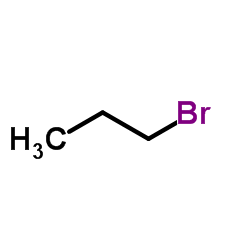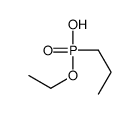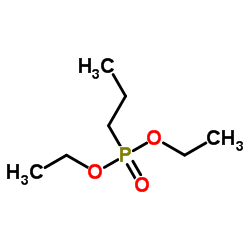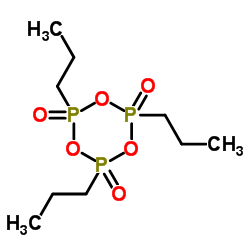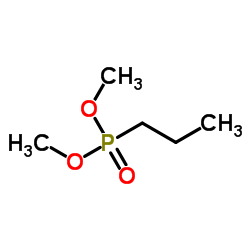4672-38-2
| 中文名 | 丙基膦酸 |
|---|---|
| 英文名 | propylphosphonic acid |
| 中文别名 |
丙烷-1-磷酸
丙基磷酸 |
| 英文别名 |
propanephosphonic acid
EINECS 225-121-8 MFCD00012294 1-propanephosphonic acid propylphosphoric acid Propane-1-phosphonic acid Propyl-phosphonic acid |
| 沸点 | 265.3ºC at 760 mmHg |
|---|---|
| 熔点 | 67-71 °C(lit.) |
| 分子式 | C3H9O3P |
| 分子量 | 124.07600 |
| 闪点 | 114.3ºC |
| 精确质量 | 124.02900 |
| PSA | 67.34000 |
| LogP | 0.57410 |
| 储存条件 | 避光,通风干燥处,密封保存 |
| 稳定性 | 常温常压下稳定,熔点: 133-136°C |
| 分子结构 | 1、 摩尔折射率:25.89 2、 摩尔体积(m3/mol):97.2 3、 等张比容(90.2K):257.0 4、 表面张力(dyne/cm):48.9 5、 极化率(10 -24cm 3):10.26 |
| 计算化学 | 1.疏水参数计算参考值(XlogP):-0.7 2.氢键供体数量:2 3.氢键受体数量:3 4.可旋转化学键数量:2 5.互变异构体数量:无 6.拓扑分子极性表面积57.5 7.重原子数量:7 8.表面电荷:0 9.复杂度:84.2 10.同位素原子数量:0 11.确定原子立构中心数量:0 12.不确定原子立构中心数量:0 13.确定化学键立构中心数量:0 14.不确定化学键立构中心数量:0 15.共价键单元数量:1 |
| 更多 | 1. 性状:白色粉末 2. 密度(g/mL,25 ºC):不确定 3. 相对蒸汽密度(g/mL,空气=1):不确定 4. 熔点(ºC):133-136 5. 沸点(ºC,常压):不确定 6. 沸点(ºC,21mmHg):不确定 7. 折射率:不确定 8. 闪点(ºC):不确定 9. 比旋光度(º,C=1, H2O):不确定 10. 自燃点或引燃温度(ºC):不确定 11. 蒸气压(kPa,25ºC):不确定 12. 饱和蒸气压(kPa,60ºC):不确定 13. 燃烧热(KJ/mol):不确定 14. 临界温度(ºC):不确定 15. 临界压力(KPa):不确定 16. 油水(辛醇/水)分配系数的对数值:不确定 17. 爆炸上限(%,V/V):不确定 18. 爆炸下限(%,V/V):不确定 19. 溶解性:不确定 |
Synonym: Section 2 - COMPOSITION, INFORMATION ON INGREDIENTS
Risk Phrases: 34 Section 3 - HAZARDS IDENTIFICATION EMERGENCY OVERVIEW
Causes burns.Hygroscopic. Potential Health Effects Eye: Causes eye burns. Skin: Causes skin burns. Ingestion: Causes gastrointestinal tract burns. Inhalation: May cause irritation of the respiratory tract with burning pain in the nose and throat, coughing, wheezing, shortness of breath and pulmonary edema. Causes chemical burns to the respiratory tract. Inhalation may be fatal as a result of spasm, inflammation, edema of the larynx and bronchi, chemical pneumonitis and pulmonary edema. Chronic: Not available. Section 4 - FIRST AID MEASURES Eyes: Immediately flush eyes with plenty of water for at least 15 minutes, occasionally lifting the upper and lower lids. Get medical aid immediately. Skin: Get medical aid immediately. Immediately flush skin with plenty of soap and water for at least 15 minutes while removing contaminated clothing and shoes. Ingestion: Do NOT induce vomiting. If victim is conscious and alert, give 2-4 cupfuls of milk or water. Get medical aid immediately. Inhalation: Get medical aid immediately. Remove from exposure to fresh air immediately. If not breathing, give artificial respiration. If breathing is difficult, give oxygen. Notes to Physician: Treat symptomatically and supportively. Section 5 - FIRE FIGHTING MEASURES General Information: As in any fire, wear a self-contained breathing apparatus in pressure-demand, MSHA/NIOSH (approved or equivalent), and full protective gear. Extinguishing Media: Use foam, dry chemical, or carbon dioxide. Autoignition Temperature: Not available. Flash Point: Not available. NFPA Rating: Not published. Explosion Limits, Lower: Not available. Upper: Not available. Section 6 - ACCIDENTAL RELEASE MEASURES General Information: Use proper personal protective equipment as indicated in Section 8. Spills/Leaks: Vacuum or sweep up material and place into a suitable disposal container. Section 7 - HANDLING and STORAGE Handling: Do not breathe dust, vapor, mist, or gas. Do not get in eyes, on skin, or on clothing. Use only in a chemical fume hood. Storage: Store in a cool, dry place. Store in a tightly closed container. Corrosives area. Section 8 - EXPOSURE CONTROLS, PERSONAL PROTECTION Engineering Controls: Use adequate ventilation to keep airborne concentrations low. Personal Protective Equipment Eyes: Wear appropriate protective eyeglasses or chemical safety goggles as described by OSHA's eye and face protection regulations in 29 CFR 1910.133. Skin: Wear appropriate protective gloves to prevent skin exposure. Clothing: Wear appropriate protective clothing to prevent skin exposure. Respirators: Follow the OSHA respirator regulations found in 29CFR 1910.134. Always use a NIOSH-approved respirator when necessary. Section 9 - PHYSICAL AND CHEMICAL PROPERTIES Physical State: Solid Appearance: Not available. Odor: Not available. pH: Not available. Vapor Pressure: Not available. Vapor Density: Not available. Evaporation Rate: Not available. Viscosity: Not available. Boiling Point: Not available. Freezing/Melting Point: 67 - 71 deg C Decomposition Temperature: Not available. Solubility: Not available. Specific Gravity/Density: Not available. Molecular Formula: C3H9O3P Molecular Weight: 124.09 Section 10 - STABILITY AND REACTIVITY Chemical Stability: Not available. Conditions to Avoid: Incompatible materials, exposure to moist air or water. Incompatibilities with Other Materials: Strong oxidizing agents - strong bases. Hazardous Decomposition Products: Phosphine, carbon monoxide, oxides of phosphorus, carbon dioxide. Hazardous Polymerization: Has not been reported Section 11 - TOXICOLOGICAL INFORMATION RTECS#: CAS# 4672-38-2: TA0420000 LD50/LC50: Not available. Carcinogenicity: Propylphosphonic acid - Not listed by ACGIH, IARC, NIOSH, NTP, or OSHA. See actual entry in RTECS for complete information. Section 12 - ECOLOGICAL INFORMATION For further information, contact Fisher Scientific. Section 13 - DISPOSAL CONSIDERATIONS Dispose of in a manner consistent with federal, state, and local regulations. Section 14 - TRANSPORT INFORMATION CDG/CPL IMO Shipping Name: CORROSIVE SOLID, ACIDIC, ORGANIC, N.O.S. Hazard Class: 8 UN Number: 3261 Packing Group: II IATA Shipping Name: CORROSIVE SOLID, ACIDIC, ORGANIC, N.O.S.* Hazard Class: 8 UN Number: 3261 Packing Group: II RID/ADR Shipping Name: CORROSIVE SOLID, ACIDIC, ORGANIC, N.O.S. Dangerous Goods Code: 8(39B) UN Number: 3261 Canadian TDG No information available. Section 15 - REGULATORY INFORMATION European/International Regulations European Labeling in Accordance with EC Directives Hazard Symbols: C Risk Phrases: R 34 Causes burns. Safety Phrases: S 26 In case of contact with eyes, rinse immediately with plenty of water and seek medical advice. S 27 Take off immediately all contaminated clothing. S 36/37/39 Wear suitable protective clothing, gloves and eye/face protection. S 28A After contact with skin, wash immediately with plenty of water. WGK (Water Danger/Protection) CAS# 4672-38-2: 1 Canada None of the chemicals in this product are listed on the DSL/NDSL list. WHMIS: Not available. CAS# 4672-38-2 is not listed on Canada's Ingredient Disclosure List. Exposure Limits US FEDERAL TSCA CAS# 4672-38-2 is not listed on the TSCA inventory. It is for research and development use only. SECTION 16 - ADDITIONAL INFORMATION N/A |
|
毒理学数据: 1 、急性毒性:大鼠口径LDLo:3723 mg/kg 2、主要的刺激性影响 在皮肤上面:在皮肤和粘膜上造成腐蚀性影响 在眼睛上面:强烈腐蚀性影响 致敏作用:没有已知的敏化影响 生态学数据: 通常对水是不危害的,若无政府许可,勿将材料排入周围环境 CHEMICAL IDENTIFICATION
HEALTH HAZARD DATAACUTE TOXICITY DATA
|
| 符号 |

GHS05 |
|---|---|
| 信号词 | Danger |
| 危害声明 | H314 |
| 警示性声明 | P280-P305 + P351 + P338-P310 |
| 个人防护装备 | Eyeshields;Faceshields;full-face particle respirator type N100 (US);Gloves;respirator cartridge type N100 (US);type P1 (EN143) respirator filter;type P3 (EN 143) respirator cartridges |
| 危害码 (欧洲) | C |
| 风险声明 (欧洲) | 34 |
| 安全声明 (欧洲) | S26-S36/37/39-S45 |
| 危险品运输编码 | UN 3260 8/PG 3 |
| WGK德国 | 1 |
| RTECS号 | TA0420000 |
| 包装等级 | III |
| 危险类别 | 8 |
| 上游产品 2 | |
|---|---|
| 下游产品 4 | |



